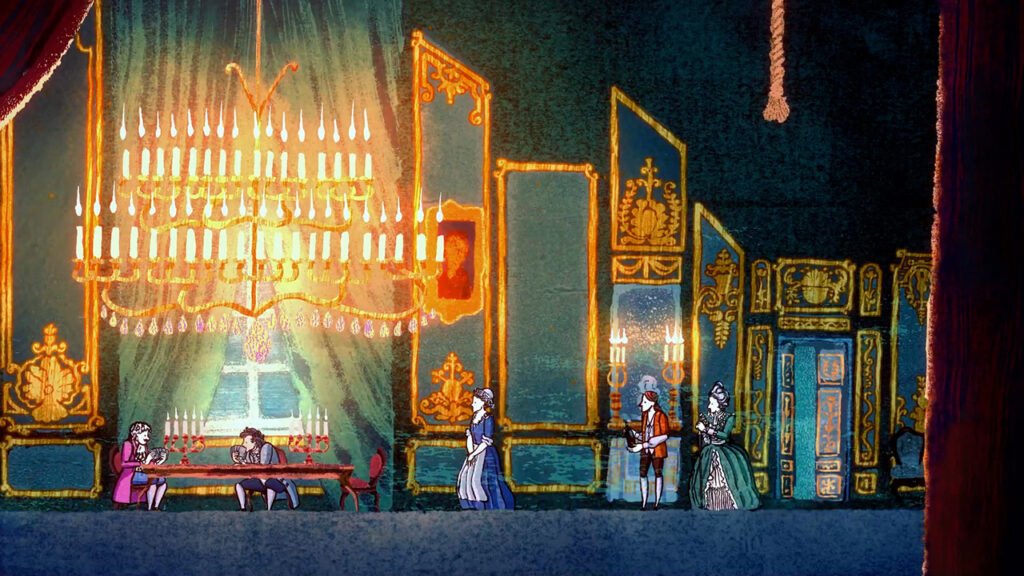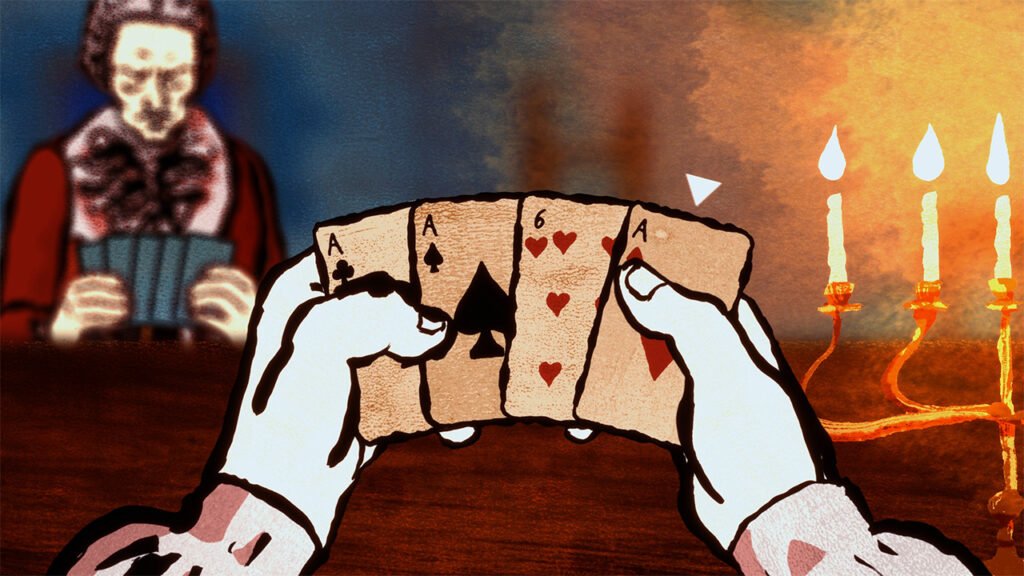Ah.. sharks. The predators of the deep, the dinosaurs of the sea, and the topic of a whole week on National Geographic or Animal Planet or… Discovery Channel, whichever runs it nowadays. What? Is this game not about actual sharks? Well, I had you fooled for a moment, didn’t I? Let’s dive into the wonderful world of card tricks, not sharks (even though we’re diving, I bet you didn’t sea that one coming).
A delicious tale of daring, deceit, and danger through 18th century France. Enter a world where you’ll need to play your opponents better than your cards. And I’m happy they do because it combines the two things I love. Card games and history! Card Shark is an adventure game full of cunning, intrigue, and delectable deceit.
“Our adversaries tonight? An evil group of scoundrels and rogues rumored to possess an unlimited fund between them. If we stick to the strategies you’ve learned, this will be a walkover.” – Comte de Saint-Germain
Comte de Saint-Germain
First, let’s do a bit of background:
The Comte de Saint Germain c. 1691 or 1712 – 27 February 1784) was a European adventurer, with an interest in science, alchemy, and the arts. He achieved prominence in European high society of the mid-1700s. Prince Charles of Hesse-Kassel considered him to be “one of the greatest philosophers who ever lived”. St. Germain used a variety of names and titles, an accepted practice amongst royalty and nobility at the time. These include the Marquis de Montferrat, Comte Bellamarre, Chevalier Schoening, Count Weldon, Comte Soltikoff, Graf Tzarogy, and Prinz Ragoczy. In order to deflect inquiries as to his origins, he would make far-fetched claims, such as being 500 years old, leading Voltaire to sarcastically dub him “The Wonderman” and that “He is a man who does not die, and who knows everything”.
His real name is unknown while his birth and background are obscure, but towards the end of his life, he claimed that he was a son of Prince Francis II Rákóczi of Transylvania. His name has occasionally caused him to be confused with Claude Louis, Comte de Saint-Germain, a noted French general.
Gameplay
You cheat your way to the top of 18th-century French society among his wings. Master deceptions using card marking, false shuffles, deck switching, false deals, and more! Use your ill-gotten gains to buy your way into the closed world of high-stakes tables. Each level takes a new trick to master – and by learning the scheme, you can win a lot of coins. What makes it even more interesting is that the player is mute, so he can only communicate with hand signals and other cleverly induced ways to give tells to his master as you climb from local card parlors to the King’s table, which leads to discovering more and more of the rotten France core of society (hey, it’s the 18th century, we all know where that one goes).
One of the gameplay features I must applaud is the level of difficulty. Each mission consists of a learning period, where you learn the ins and outs of a new trick that you will use to cheat, then you may practice the trick to your liking. After that is the test, where you perform the trick on your victims, going quickly and subtly to avoid their suspicion, this slow buildup of difficulty works perfectly in the story. As you get richer, the consequences of being caught rise, and the increasing difficulty puts that stress into reality. Almost always, you feel as if you are just barely keeping it together, getting away by the skin of your teeth.
Card Shark’s gameplay is of a rare breed. It is not only mechanically satisfying, requiring legitimate skill, but also ties into the emotions that the game wants to evoke, thus connecting the player to the protagonist and adding a slight extra challenge. Nothing is scarier than stress giving you a shaky hand in a game based on precise, quick movements.
Travel through 18 century France
Another aspect I liked was the setting of Card Shark. You discover small towns, remote mansions, and luxurious lounges imagined by the Nerial team (Reigns) and game creator Arnaud De Bock (Pikuniku). It gives you the room to Immerse yourself in the ornate visual artwork of Nicolai Troshinsky. Have your every move accompanied by an original score from Andrea Boccadoro as interpreted by an orchestra.
Conclusion
To me, Card Shark is a beautiful expression of some of the unique strengths video games have as a medium for engaging storytelling. Without going into too much detail, the gameplay is unlike any other game I’ve played. Still, it is quite simple, gameifying cheating at table games in a tense yet fun way. The game intuitively builds the player’s repertoire of skills as the game progresses and marries your adventure beautifully with a gorgeous painted art style. The story and dialogue (no voice acting) are often funny or gripping and always charming. Just don’t think you’ll be playing just ‘another’ card game – it’s so much more.





